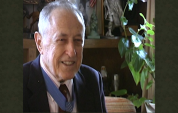11:50 | Ray Davis had distinguished himself in the Pacific campaigns and when he returned stateside, he was assigned to Quantico and the Marine schools. When the next war started, his regiment didn't exist but it was quickly formed and dispatched to Korea. Once the Chinese entered the fray, his battalion trekked up to the Chosin Reservoir where there was nothing but trouble. Part 1 of 2.
Keywords : Ray Davis Quantico Korea Harry S. Truman Camp Pendleton Inchon Seoul Wonsan Chinese Douglas MacArthur Koto-ri Hagaru-ri Chosin Reservoir cold frozen Toktong Pass communists

While at Georgia Tech, Ray Davis switched from Army ROTC to Navy ROTC and received a commission in the Marine Corps. He was at Camp Lejeune when Pearl Harbor was attacked and soon found himself in the Pacific, defending the airfield on Guadalcanal with an anti-aircraft unit. Everyone had malaria and there were no medical supplies but the Marines held fast.
After the bloody battle on Guadalcanal, Ray Davis was promoted to major and put in command of a Marine Battalion. His next landing was at Peleliu, which was supposed to be an easy one but was anything but. By the time it was over, he had earned the Navy Cross.
F Company was trying to hold the Toktong Pass. They were cut off and under heavy fire. Battalion commander Ray Davis came up with a plan to go around and approach the site from behind. It was a difficult trek in the mountains but he pulled it off, rescued the trapped company and opened up the pass. This enabled the US forces to "advance towards the rear" and successfully evacuate. This action earned him multiple awards, including the Medal of Honor. Part 2 of 2.
We had to give up a lot of real estate when the fighting in Korea became focused on the demarcation line. Some units were very far to the north and had to pull back. Ray Davis had commanded a battalion during some of the fiercest fighting but there was a rotation system, so he was back home when the stalemate started.
The Chinese and the North Koreans were difficult to face because of the sheer numbers, if nothing else. Ray Davis faced them and the Japanese before them. He would eventually face the Viet Cong and North Vietnamese but there is no question in his mind who the toughest foe was.
Based on his service in Korea and on his many trips back there, Ray Davis developed a great deal of admiration for the Korean people. It is nothing short of a miracle what they have done in their country since that war.
When Ray Davis assumed command of the 3rd Marine Division in Vietnam, he had one clear idea in mind. Change from a defensive and reactive posture to an offensive one. This led to great success against both the NVA and the Viet Cong but, to his dismay, this was not a war that Washington was going to let him win.
When Ray Davis was in command of the 3rd Marine Division in Vietnam, his son, Miles, arrived to command a rifle platoon. The general even walked patrol with him a few times. Years later, he would hear some gentle ribbing because he was usually flying overhead in his command chopper while Miles was slogging his way through the jungle.
General Ray Davis pays tribute to his mates in the Marine Corps, especially his early friendships at the schools. He could not have succeeded like he did without their help.
Ray Davis was back at the Marine Corps schools where he had a run-in with a new boss. Friendships matter and some friends in high places rescued him and got him into a better job at the War College. Then he got exposed to intelligence work at Marine Corps HQ, followed by a tour in Europe. But there was a little place in Southeast Asia that was starting to heat up.
After his Vietnam tour, General Ray Davis had a series of jobs at Quantico and in Washington, the last of which was Assistant Commandant of the Marine Corps. He did not slow down in retirement, however.

Medal of Honor awarded to General Raymond Davis when he was still a Lieutenant Colonel (1st Battalion, 7th Marines, 1st Marine Division).